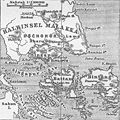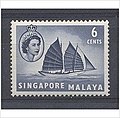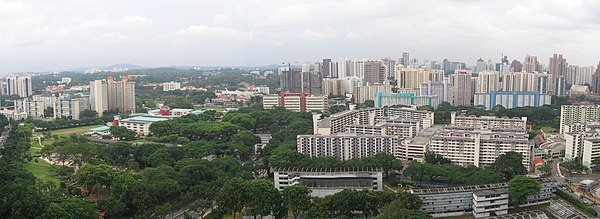Portal:Singapore
 Map of Singapore Singapore, officially the Republic of Singapore, is an island country and city-state in maritime Southeast Asia. The country's territory comprises one main island, 63 satellite islands and islets, and one outlying islet. It is about one degree of latitude (137 kilometres or 85 miles) north of the equator, off the southern tip of the Malay Peninsula, bordering the Strait of Malacca to the west, the Singapore Strait to the south along with the Riau Islands in Indonesia, the South China Sea to the east, and the Straits of Johor along with the State of Johor in Malaysia to the north.
Singapore's history dates back at least eight hundred years, having been a maritime emporium known as Temasek and subsequently a major constituent part of several successive thalassocratic empires. Its contemporary era began in 1819, when Stamford Raffles established Singapore as an entrepôt trading post of the British Empire. In 1867, Singapore came under the direct control of Britain as part of the Straits Settlements. During World War II, Singapore was occupied by Japan in 1942 and returned to British control as a separate Crown colony following Japan's surrender in 1945. Singapore gained self-governance in 1959 and, in 1963, became part of the new federation of Malaysia, alongside Malaya, North Borneo, and Sarawak. Ideological differences led to Singapore's expulsion from the federation two years later; Singapore became an independent sovereign country in 1965. After early years of turbulence and despite lacking natural resources and a hinterland, the nation rapidly developed to become one of the Four Asian Tigers. As a highly developed country, it has one of the highest GDP per capita (PPP) in the world. It is also identified as a tax haven. Singapore is the only country in Asia with a AAA sovereign credit rating from all major rating agencies. It is a major aviation, financial, and maritime shipping hub and has consistently been ranked as one of the most expensive cities to live in for expatriates and foreign workers. Singapore ranks highly in key social indicators: education, healthcare, quality of life, personal safety, infrastructure, and housing, with a home-ownership rate of 88 percent. Singaporeans enjoy one of the longest life expectancies, fastest Internet connection speeds, lowest infant mortality rates, and lowest levels of corruption in the world. It has the third highest population density of any country in the world, although there are numerous green and recreational spaces as a result of urban planning. With a multicultural population and in recognition of the cultural identities of the major ethnic groups within the nation, Singapore has four official languages: English, Malay, Mandarin, and Tamil. English is the common language, with exclusive use in numerous public services. Multi-racialism is enshrined in the constitution and continues to shape national policies in education, housing, and politics. Singapore is a parliamentary republic in the Westminster tradition of unicameral parliamentary government, and its legal system is based on common law. While the country is de jure a multi-party democracy with free elections, the government under the People's Action Party (PAP) wields widespread control and political dominance. The PAP has governed the country continuously since full internal self-government was achieved in 1959, and holds a supermajority in Parliament. One of the five founding members of ASEAN, Singapore is also the headquarters of the Asia-Pacific Economic Cooperation Secretariat, the Pacific Economic Cooperation Council Secretariat, and is the host city of many international conferences and events. Singapore is also a member of the United Nations, the World Trade Organization, the East Asia Summit, the Non-Aligned Movement, and the Commonwealth of Nations. (Full article...)Selected article -The Toa Payoh ritual murders took place in Singapore in 1981. On 25 January, the body of a nine-year-old girl was found at a block of public housing flats in the town of Toa Payoh, and two weeks later, the body of a ten-year-old boy was found nearby. The murders were masterminded by Adrian Lim, a self-styled healer who pretended to have supernatural powers and scammed people for years before the murders. He had also been sexually assaulting female clients, often preying on younger women from impoverished backgrounds. He married one such woman Tan Mui Choo and took on another woman Hoe Kah Hong as his "holy wife"—a term he used to manipulate women into having sex with him. Lim subjected them to extensive physical, mental and financial abuse, as well as sexual torture,for years before instigating the killings. (Full article...) Selected pictureThe Tanglin Police Division (or 'E' Division, Chinese: 东陵警区) is a police division of the Singapore Police Force. It manages a varied, highly urbanised area of central Singapore, which includes the public housing towns of Bishan, Toa Payoh and parts of Kallang, large areas of private housing areas such as those in Bukit Timah and Novena, as well as key commercial areas such as Orchard Road and Clarke Quay. Read more... General imagesThe following are images from various Singapore-related articles on Wikipedia.
Selected biography - Denise Phua Lay Peng (Chinese: 潘丽萍; pinyin: Pān Lìpíng; born 9 December 1959) is a Singaporean politician who has been serving as Mayor of Central Singapore District since 2014. A member of the governing People's Action Party (PAP), she has been the Member of Parliament (MP) representing the Kampong Glam division of Jalan Besar GRC since 2015. Prior to entering politics, she is a full-time special needs volunteer after working in the private sector for two decades. She became the president of the Autism Resource Centre and co-founded Pathlight School. (Full article...) Did you know (auto-generated)
In this month
More did you know -
Selected panoramaBukit Ho Swee is a place in Singapore which is located near Jalan Bukit Ho Swee. It was once an unplanned self-built township of about 20,000, though this was destroyed by the Bukit Ho Swee Fire, which broke out on 25 May 1961. It is now a residential area with little remains of its chaotic past. Singapore topicsRelated portalsSoutheast Asia Other Countries Tasks
CategoriesWikiprojectsAssociated WikimediaThe following Wikimedia Foundation sister projects provide more on this subject:
Discover Wikipedia using portals |






























































